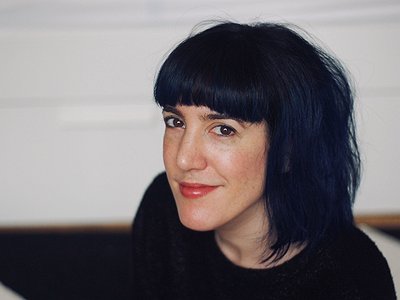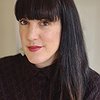Part 1
Name: Madeleine Cocolas
Nationality: Australian
Occupation: Producer, composer
Current Release: Ithaca on Someone Good
Recommendations: The book “The Everlasting Sunday” by Robert Lukins and the album “Listening to Pictures” by Jon Hassell
If you enjoyed this interview with Madeleine Cocolas, you can find out more about her on her homepage.
When did you start writing/producing music - and what or who were your early passions and influences? What what is about music and/or sound that drew you to it?
I started playing piano when I was five and have been writing music for as long as I can remember. As a child I spent hours improvising at the piano and could get completely lost in it. I wasn’t a great piano student as I would often start playing a piece of music and then get distracted and end up playing something completely different.
My very early influences were Vangelis, Jean Michel Jarre and Mike Oldfield (thanks dad) and lots of classical music (thanks mum) and that turned into Philip Glass and Arvo Pärt when I was a bit older. I played bass guitar in a bunch of bands while I was at university and by then I had a pretty diverse taste in music.
I’m not sure what exactly it was about music and sound that first drew me in, but I have always loved listening and I have always loved sounds. It is all encompassing.
For most artists, originality is first preceded by a phase of learning and, often, emulating others. What was this like for you? How would you describe your own development as an artist and the transition towards your own voice? What is the the relationship between copying, learning and your own creativity?
I spent many years struggling to find my own voice and writing fairly standard post classical style piano pieces with a very strong minimalist influence. When I moved to Seattle in 2012, I felt really isolated and at that point, to help give me a sense of purpose, I decided to embark on a project which I called “Fifty Two Weeks” whereby I wrote a piece of music every week (or there about) for a year. Each week I would set myself different challenges and parameters so I very quickly broke out of the ‘post classical piano’ style and started experimenting with other instruments and sounds and exploring the production side of things much more rigorously. I was really disciplined about it because I wanted to prove to myself I could do it.
That year of pushing myself outside my musical comfort zone really helped me towards finding my individual ‘voice’, but of course finding your voice is one thing, constantly pushing it forwards is another.
What were your main compositional- and production-challenges in the beginning and how have they changed over time?
My main compositional challenge in the beginning was trying to find my own voice. I had a lot to say, but I had trouble getting my ideas to sound how I wanted them to and not sound derivative. Now I think my challenge lies in trying to move forward and not look back and repeat what I have done previously.
My initial production challenges were mostly financial in terms of all the costs involved in setting up a studio from scratch. Then the next challenge was learning how to use everything, as to start with I wasn’t particularly interested in the technology side of things, and I thought of technology as a means to an end. Nowdays I really enjoy the production aspect of music, and my production challenges lie in trying to get things to sound how I want them to from a technical perspective, and trying to expand my knowledge and application of different production techniques.
What was your first studio like? How and for what reasons has your set-up evolved over the years and what are currently some of the most important pieces of gear for you?
I have always had a really streamlined studio, probably because I’ve spent the last decade and a bit moving around a lot.
My first studio was simply a piano, midi controller keyboard and Protools. I haven’t accumulated a lot of gear and I still have a really simple streamlined studio consisting of a piano, Nord Stage 2, AKG microphones, KRK speakers, Dave Smith Mopho synthesizer, O-Coast synthesizer, my bass guitar and other bits and pieces. I like the simplicity of it and the restrictions it imposes. I don’t like feeling too overwhelmed by gear.
These days I use Logic for my recordings and for editing and processing sounds. My favorite piece of equipment is still my piano though, which is very special to me as it was my grandmother's. It is so beautiful seeing my children learn on it.
How do you make use of technology? In terms of the feedback mechanism between technology and creativity, what do humans excel at, what do machines excel at?
I used to do all my creating at a piano, but I now do the vast amount of creating on my Nord and I record my initial improvisations directly into Logic from the start. Me from about fifteen years ago would be absolutely horrified to hear that I write on my Nord and not my piano! Once I’ve got my rough ideas down, I go back and find bits that I like and pull them out to work on them further and at that point I start thinking about how I want the overall piece to sound in a broad sense. I also do my sound manipulation and editing in Logic as well.
Technology is integral to my compositional process from the beginning. It is my sketchpad. Whilst I think that technology can provide some incredible opportunities, I try really hard to not hand over any creative decisions to technology and I make sure I still feel connected to what I have written and I always recognize myself in my music.
I think machines excel at processing complex and sometimes tedious tasks at speeds that would be impossible for humans, whilst humans excel at intuition, emotions and conveying stories.
Production tools, from instruments to complex software environments, contribute to the compositional process. How does this manifest itself in your work? Can you describe the co-authorship between yourself and your tools?
I use my production tools, from my instruments to my software, as a natural extension of my ideas. For example I work best if I have a piano or keyboard right in front of me. I get all my ideas out this way, and without instruments I would feel like I had been robbed of part of my voice. And as I mentioned before, I use my software as a sketchpad to get my ideas down, but also to refine them and ultimately record my final pieces. My production tools are essential to my compositional process from start to finish.
Collaborations can take on many forms. What role do they play in your approach and what are your preferred ways of engaging with other creatives through, for example, file sharing, jamming or just talking about ideas?
I love collaborations and I think over the years I’ve collaborated with people in many different ways. For my previous album ‘Metropolitan’ I collaborated with software developer Gregory Long. The premise of that album was that when I was living in New York, my favorite museum was the Metropolitan Museum of Art and I wanted to create an album about the Met. So I chose 9 artworks that really spoke to me and Gregory wrote custom software to process each image into midi using different parameters (for example some of the images were analyzed using a color spectrum whilst other images were analyzed using their shapes). I then took the midi and used it as the basis of my individual pieces on the album, with each piece representing a specific artwork.
I also really love collaborating with people through file sharing because this gives me time to think about things in my own time and play around with a few ideas before sending it over to someone else. And I love getting something back from a collaborator and seeing where they have taken it. It’s wonderful to be able to listen with fresh ears each time you are given a new iteration of a project.






